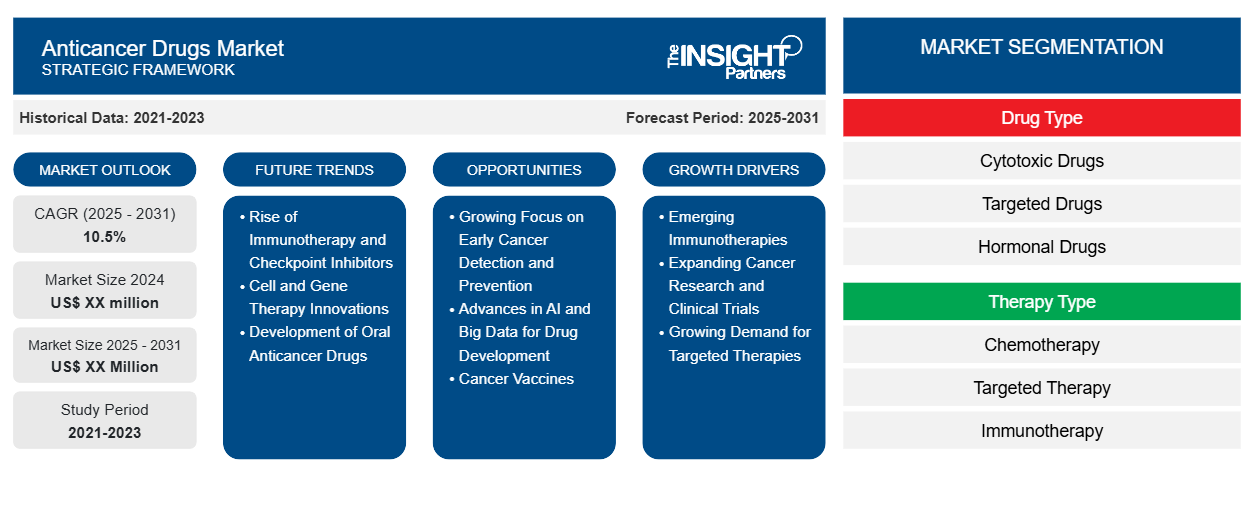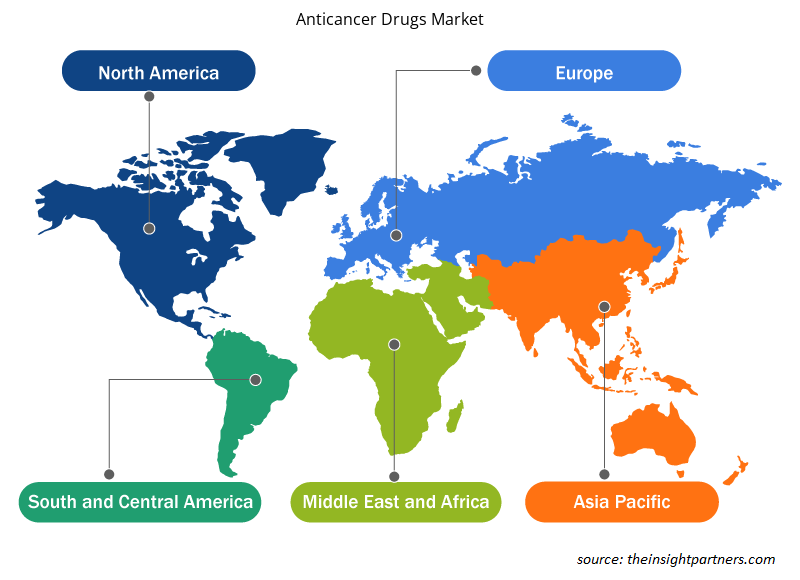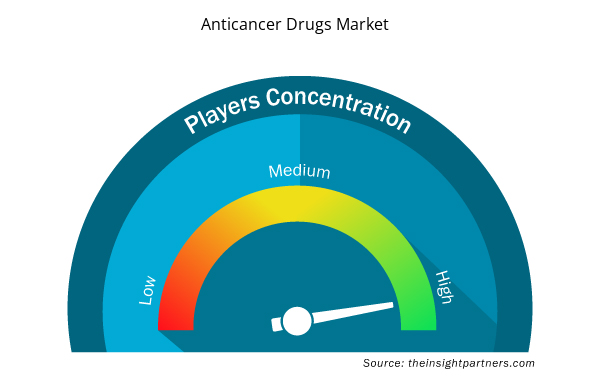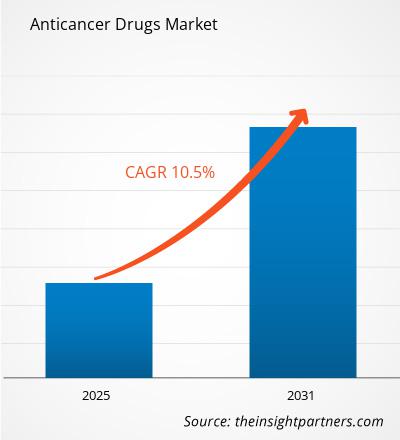The Anticancer Drugs Market is expected to register a CAGR of 10.5% from 2025 to 2031, with a market size expanding from US$ XX million in 2024 to US$ XX Million by 2031.
The Anticancer Drugs Market report covers segmental analysis by Drug Type (Cytotoxic Drugs, Targeted Drugs, Hormonal Drugs); Therapy Type (Chemotherapy, Targeted Therapy, Immunotherapy); Cancer Type (Lung Cancer, Breast Cancer, Leukemia, Colorectal Cancer), and Geography (North America, Europe, Asia Pacific, and South and Central America). The global analysis is further broken down at the regional level and major countries. The report Offers the Value in US$ for the above analysis and segments.
Purpose of the Report
The report Anticancer Drugs Market by The Insight Partners aims to describe the present landscape and future growth, top driving factors, challenges, and opportunities. This will provide insights to various business stakeholders, such as:
- Technology Providers/Manufacturers: To understand the evolving market dynamics and know the potential growth opportunities, enabling them to make informed strategic decisions.
- Investors: To conduct a comprehensive trend analysis regarding the market growth rate, market financial projections, and opportunities that exist across the value chain.
- Regulatory bodies: To regulate policies and police activities in the market with the aim of minimizing abuse, preserving investor trust and confidence, and upholding the integrity and stability of the market.
Anticancer Drugs Market Segmentation
Drug Type
- Cytotoxic Drugs
- Targeted Drugs
- Hormonal Drugs
Therapy Type
- Chemotherapy
- Targeted Therapy
- Immunotherapy
Cancer Type
- Lung Cancer
- Breast Cancer
- Leukemia
- Colorectal Cancer
Customize This Report To Suit Your Requirement
You will get customization on any report - free of charge - including parts of this report, or country-level analysis, Excel Data pack, as well as avail great offers and discounts for start-ups & universities
Anticancer Drugs Market: Strategic Insights

- Get Top Key Market Trends of this report.This FREE sample will include data analysis, ranging from market trends to estimates and forecasts.
Anticancer Drugs Market Growth Drivers
- Emerging Immunotherapies: Immunotherapy has become one of the most promising advancements in the Anticancer Drugs Market. These therapies boost the body’s immune system to recognize and destroy cancer cells. The introduction of immune checkpoint inhibitors, monoclonal antibodies, and CAR-T therapies is revolutionizing cancer treatment, and driving the market’s growth.
- Expanding Cancer Research and Clinical Trials: Ongoing research into cancer biology and the increasing number of clinical trials are fueling the discovery of new Anticancer Drugs. As more treatments move through clinical phases, the potential for new, more effective drugs to enter the market grows. This creates a dynamic and constantly evolving marketplace, attracting investment and interest from large pharmaceutical and smaller biotech firms.
- Growing Demand for Targeted Therapies: Targeted therapies, which focus on specific molecules involved in cancer cell growth, are increasingly gaining popularity within the Anticancer Drugs Market. These therapies are less toxic and more effective than traditional chemotherapy, offering patients improved outcomes with fewer side effects. The increasing demand for these precision-based treatments is driving the market's growth.
Anticancer Drugs Market Future Trends
- Rise of Immunotherapy and Checkpoint Inhibitors: Immunotherapy is rapidly becoming one of the most revolutionary treatment modalities in the Anticancer Drugs Market. In the future, the use of immune checkpoint inhibitors, which help the immune system recognize and attack cancer cells, will increase. The success of therapies like PD-1 and PD-L1 inhibitors has already paved the way for new generations of immunotherapeutic drugs. As research advances, combination therapies involving immunotherapies with traditional drugs or targeted treatments are expected to dominate the market, offering enhanced efficacy and fewer side effects.
- Cell and Gene Therapy Innovations: Cell and gene therapies are emerging as transformative treatments for cancer. CAR-T cell therapy, which involves modifying a patient's T cells to attack cancer cells, has already demonstrated remarkable success in treating certain blood cancers. The future of the Anticancer Drugs Market will see broader applications of gene editing technologies such as CRISPR to develop targeted treatments that can modify cancer-causing genes. These innovations are expected to open new frontiers in cancer treatment, providing new hope for patients with advanced or hard-to-treat cancers.
- Development of Oral Anticancer Drugs: The future trend in the Anticancer Drugs Market will see an increasing focus on the development of oral Anticancer Drugs. Oral drugs are convenient and can be administered at home, improving patient compliance and quality of life. The demand for oral therapies is expected to rise, especially for cancers such as chronic myelogenous leukemia (CML) and prostate cancer, where oral drugs like tyrosine kinase inhibitors and hormone therapies are becoming first-line treatments.
Anticancer Drugs Market Opportunities
- Growing Focus on Early Cancer Detection and Prevention: With advancements in early cancer detection and prevention, there are new opportunities to develop Anticancer Drugs that can be used as part of chemoprevention strategies. Drugs that reduce the risk of cancer in high-risk individuals or prevent cancer recurrence are in demand. As cancer detection techniques such as liquid biopsy and genetic testing improve, the Anticancer Drugs Market offers opportunities to develop preventive treatments that target precancerous conditions or genetic mutations, thereby improving long-term outcomes.
- Advances in AI and Big Data for Drug Development: The use of artificial intelligence (AI) and big data analytics in drug discovery presents a unique opportunity in the Anticancer Drugs Market. AI can analyze vast datasets to predict which drug candidates are most likely to succeed in treating cancer, accelerating the drug development process. Pharmaceutical companies that adopt AI-driven drug discovery models will be able to identify novel drug candidates faster, reduce research costs, and ultimately bring more effective Anticancer Drugs to market more quickly.
- Cancer Vaccines: The development of cancer vaccines is another growing opportunity in the Anticancer Drugs Market. Vaccines that prevent or treat cancer by stimulating the immune system to recognize and destroy cancer cells are gaining significant interest. The approval of vaccines such as the HPV vaccine for cervical cancer has paved the way for further research into cancer vaccines for other cancer types. The development of such vaccines represents a significant opportunity for companies to enter the Anticancer Drugs Market with innovative products that offer both preventive and therapeutic benefits.
Anticancer Drugs Market Regional Insights
The regional trends and factors influencing the Anticancer Drugs Market throughout the forecast period have been thoroughly explained by the analysts at Insight Partners. This section also discusses Anticancer Drugs Market segments and geography across North America, Europe, Asia Pacific, Middle East and Africa, and South and Central America.

- Get the Regional Specific Data for Anticancer Drugs Market
Anticancer Drugs Market Report Scope
| Report Attribute | Details |
|---|---|
| Market size in 2024 | US$ XX million |
| Market Size by 2031 | US$ XX Million |
| Global CAGR (2025 - 2031) | 10.5% |
| Historical Data | 2021-2023 |
| Forecast period | 2025-2031 |
| Segments Covered |
By Drug Type
|
| Regions and Countries Covered | North America
|
| Market leaders and key company profiles |
Anticancer Drugs Market Players Density: Understanding Its Impact on Business Dynamics
The Anticancer Drugs Market market is growing rapidly, driven by increasing end-user demand due to factors such as evolving consumer preferences, technological advancements, and greater awareness of the product's benefits. As demand rises, businesses are expanding their offerings, innovating to meet consumer needs, and capitalizing on emerging trends, which further fuels market growth.
Market players density refers to the distribution of firms or companies operating within a particular market or industry. It indicates how many competitors (market players) are present in a given market space relative to its size or total market value.
Major Companies operating in the Anticancer Drugs Market are:
- AbbVie Inc.
- Astellas Pharma Inc.
- AstraZeneca PLC
- Celgene Corporation
- F. Hoffmann-la Roche ltd.
- Johnson & Johnson
Disclaimer: The companies listed above are not ranked in any particular order.

- Get the Anticancer Drugs Market top key players overview
Key Selling Points
- Comprehensive Coverage: The report comprehensively covers the analysis of products, services, types, and end users of the Anticancer Drugs Market, providing a holistic landscape.
- Expert Analysis: The report is compiled based on the in-depth understanding of industry experts and analysts.
- Up-to-date Information: The report assures business relevance due to its coverage of recent information and data trends.
- Customization Options: This report can be customized to cater to specific client requirements and suit the business strategies aptly.
The research report on the Anticancer Drugs Market can, therefore, help spearhead the trail of decoding and understanding the industry scenario and growth prospects. Although there can be a few valid concerns, the overall benefits of this report tend to outweigh the disadvantages.
- Historical Analysis (2 Years), Base Year, Forecast (7 Years) with CAGR
- PEST and SWOT Analysis
- Market Size Value / Volume - Global, Regional, Country
- Industry and Competitive Landscape
- Excel Dataset



Report Coverage
Revenue forecast, Company Analysis, Industry landscape, Growth factors, and Trends

Segment Covered
This text is related
to segments covered.

Regional Scope
North America, Europe, Asia Pacific, Middle East & Africa, South & Central America

Country Scope
This text is related
to country scope.
Frequently Asked Questions
The Anticancer Drugs Market is expected to register a CAGR of 10.5% from 2025-2031.
The major factors impacting the Anticancer Drugs Market are: Emerging Immunotherapies, Expanding Cancer Research and Clinical Trials and Growing Demand for Targeted Therapies
Key future trends in this market are - Rise of Immunotherapy and Checkpoint Inhibitors, Cell and Gene Therapy Innovations and Development of Oral Anticancer Drugs
Key companies of this market are: AbbVie Inc., Astellas Pharma Inc., AstraZeneca PLC, Celgene Corporation, F. Hoffmann-la Roche ltd., Johnson & Johnson, Merck & Co., Inc., Novartis AG, Pfizer Inc., Sanofi
The report can be delivered in PDF/PPT format; we can also share excel dataset based on the request.
Some of the customization options available based on request are additional 3–5 company profiles and country-specific analysis of 3–5 countries of your choice. Customizations are to be requested/discussed before making final order confirmation, as our team would review the same and check the feasibility.
Trends and growth analysis reports related to Life Sciences : READ MORE..
1. AbbVie Inc.
2. Astellas Pharma Inc.
3. AstraZeneca PLC
4. Celgene Corporation
5. F. Hoffmann-la Roche ltd.
6. Johnson & Johnson
7. Merck & Co., Inc.
8. Novartis AG
9. Pfizer Inc.
10. Sanofi

 Get Free Sample For
Get Free Sample For